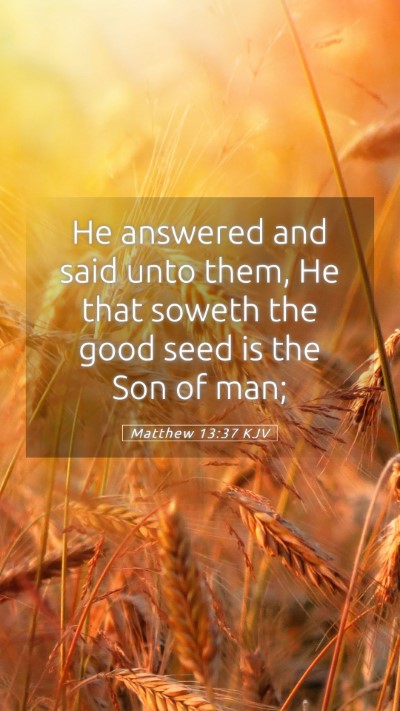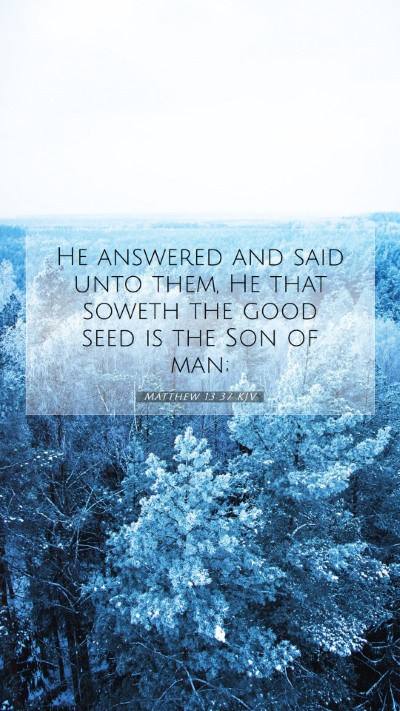Understanding Matthew 13:37
In the context of biblical studies and interpretations, Matthew 13:37 offers profound insights into the nature of the Kingdom of God and the roles individuals play within it. This verse is part of a larger discourse where Jesus presents parables to explain divine truths. Below, we break down the meaning of this verse through the lenses of notable public domain commentaries.
Verse Analysis
Matthew 13:37 states: "He answered and said unto them, He that soweth the good seed is the Son of man." This declaration is essential for understanding the identity of the sower and the nature of the seeds in the parable. The good seed represents the children of the kingdom, sown by Jesus Christ Himself.
Commentary Insights
-
Matthew Henry's Commentary:
Henry emphasizes that the Son of Man, referring to Jesus, is the one who sows the good seed. This act symbolizes the propagation of the gospel and the establishment of the Kingdom of Heaven on earth. Henry explains that the distinction between the good and bad seed highlights the church's composition, consisting of true believers alongside those who may not genuinely belong to the faith.
-
Albert Barnes' Commentary:
Barnes focuses on the significance of the title “Son of Man,” which encapsulates both Jesus’ humanity and His divine mission. The "good seed" conveys the idea of those who receive and accept the gospel, signifying their role in God’s redemptive plan. Barnes also discusses the implications of judgment, indicating that the harvest will reveal the true nature of each individual’s faith.
-
Adam Clarke's Commentary:
Clarke notes the metaphorical parallels drawn between the agricultural practices of sowing and the spiritual sowing of divine truths. He underlines that understanding this metaphor is crucial for a comprehensive biblical exegesis of the parables. Clarke's analysis goes further to elaborate on the qualities of the good seed as those who genuinely follow Christ’s teachings and embody His message.
Significance of the Verse
Matthew 13:37 serves as a reminder of the transformative power of Jesus' teachings and the importance of being a part of the “good seed.” This distinction plays a crucial role in understanding Scripture, focusing on Christian identity and responsibility. The interpretations highlight several aspects:
- Identity in Christ: Believers are identified as the good seed, called to reflect the character of Christ in their lives.
- Responsibility to Share: Just as Christ sows, Christians are also called to sow the gospel, reaching out to others with the message of salvation.
- Expectation of Growth: The growth and fruitfulness of the good seed indicate that true faith will manifest in good works, aligning with James 2:17, where faith without works is dead.
Practical Application
Understanding Matthew 13:37 invites believers to reflect on their own faith journey. Here are some ways to apply the insights gained:
- Engage in Personal Reflection: Ask yourself if you see the fruits of the Spirit in your life, reflecting the identity as good seed.
- Participate in Community: Join Bible study groups to foster deeper discussions and explorations of Scripture.
- Active Evangelism: Be intentional about sharing the gospel message with others, encouraging their growth in Christ.
Cross References
Several biblical passages complement the themes found in Matthew 13:37:
- Matthew 13:24-30: The parable of the wheat and the tares, illustrating the coexistence of good and evil until the end times.
- John 12:24: The metaphor of the seed falling into the ground, emphasizing the necessity of dying to self for life to be produced.
- Galatians 6:7-9: The principle of sowing and reaping, where one's actions determine their spiritual harvest.
Conclusion
In summary, Matthew 13:37 provides a rich basis for understanding the profound truths of the gospel and the role of believers within the Kingdom of God. The collaborative insights from esteemed commentators deepen our bible verse understanding and offer avenues for bible study insights that are essential for spiritual growth. Engaging with Scripture through bible study resources and guided discussions will enhance one's biblical exegesis and encourage the application of these teachings in everyday life.


